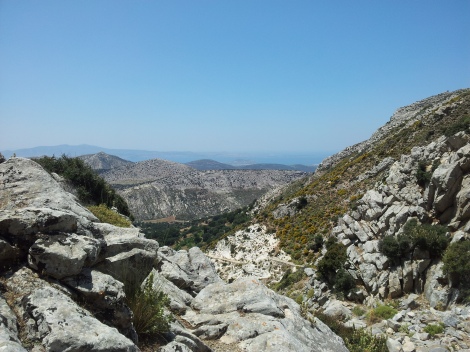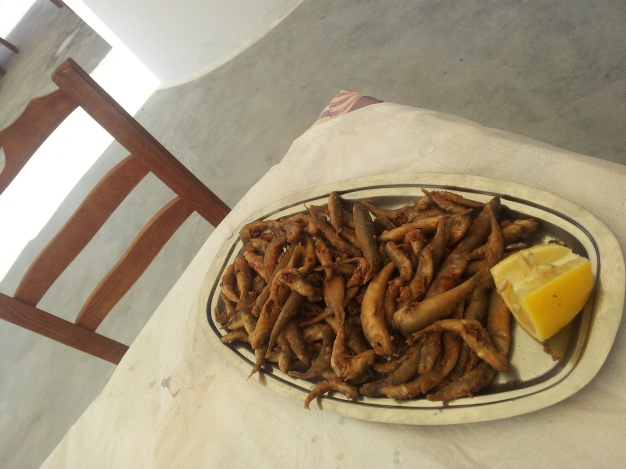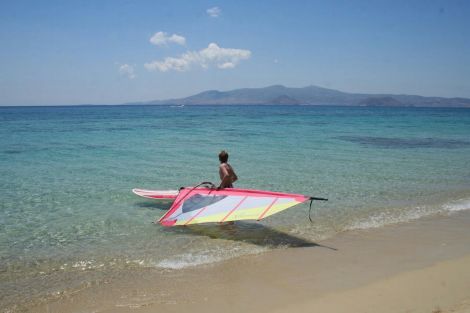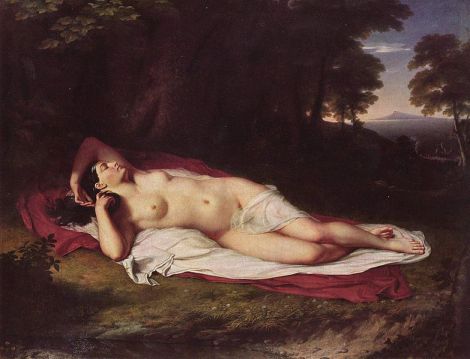Once the door to this ancient land of Gods has been opened, there is no way back, but an eternal longing for more.
The door opens with the understanding of Greek. A language so simple and easy as the local ‘xeema’. The cheap wine that may be too watery, too young or too sweet, but may also be remarkably complex and tasty. I am talking of Dimothiki, modern Greek. Old Greek, Katharevosa, is something else. The two versions of the Greek language are as intertwined and different as the Greek Orthodox Church and it’s motley congregation, spitting sunflower seeds and bad jokes at the simple kafeinion across the street from it’s rich and holy grounds.
The door opens the day the sound of Rembetika (Greek blues) gets through your bones, together with the smell of fried sardines, thyme, ripening figs and a burning memory of Georgos. The Zorba of Kos, dancing Thiftetelia in whisky flames on your table, to the tribal sound of ‘kefi’ inflaming the audience.
The door opens up with the slamming sound of the Meltemi, shutting forgotten doors and windows, making women howl to each other across roof tops, accompanied by the sound of a motorbike screaming pass you.
The door opens as you roll the dice and move the ‘tavli’ (backgammon) under the cool shades on a platanos, given it’s name by the old platano tree on the square where you sit on a simple chair belonging to an old kafenion, where the either lazy or eager owner (depending on the time of day) serves you rich Greek coffee (once Turkish) in tiny white cups, together with a glass of crystal clear water and a cinnamon cookie.
You roll the dice and feel time and destiny thick as sirup in the air around you. The faint and quiet little village has small windows, shut at daytime, lit up with neon lights at night. Groups of friends and family members are seen sharing a meal, a bottle of raki and stories. The sun sets like a bleeding blood orange behind rugged mountains, where munks have sacrified everything to build chapels and monasteries, churches and hermitages in pure protest against the power of nature. Places where lions, partisans, raped virgins and molested boys, retarded victims of ‘survival of the fittest’ have screamed of evil, ignorance, death and pain, until it became the sound of the wind now bringing their suffering to your unconscious mind. At night you dream, toss and turn, unknowing why and what rides you.

The view from Zevs cave under the highest peak on Naxos. The cave was the home of the first Neolitic inhabitants here, around 4-5000 yrs. B.C.
The faces around you have seen and fighted the enemy eye to eye, whether it has been the Turks, the Italians, Germans or their own brothers. The only enemy they never fought was you, the tourist.
Old cultures and civilizations may be lost forever here, to be replaced with a devastating degradation of anything you thought civilized. Cheap concrete buildings are replacing the Acropolises, the temples, the theatres and the Venetian mansions once housing wealthy merchants, now housing a bunch of ignorant charter-tourists and discos devoted to everything degrading, demoralizing, forgetting, copying, destructing and polluting the heart, mind and soul. The Dionysion shadow, the road to Hades, the turning back to see everything you loved turned into salt.
In an ugly and unhappy world the richest man can purchase nothing but ugliness and unhappiness. (G.B.Shaw)
This was once the site of cultures Henry Miller describes as unsurpassed. Agamamnons cruel paradise. The Minoan genius societies. The inventors of the wheel, the alphabet and joyous living. Santorini may have been the mythical city of Atlantis, What’s left to archeologists are probably only their port. On the edge of the deep blue crater, invaded by cruiseliners, now rules Mammon, a golden snake of jewelry shops, where high heeled newly weds and newly rich are crawling like lice back and forth at night, to keep his thirst alive.
Yet, Miller did not live through the age of the technology revolution, the internet, the boutique hotels and the growing revitalization of old cultural gems, wether it be the food, the architecture, the music or magnificent ships. He would be happy to see it’s also here, now, among the litter of cheap industrialized rubbish. The old Greek, however, is more rare, but not extinct. It may be Jeroen, jumping on his windsurf, heading for the horizon with immense energy and passion. Behind his yellow sunglasses hides a free soul who during the harsh winters in Naxos stays in a remote cabin where he occupies himself with model airplanes. His hair, voice, eyes and glistering muscles are the harmoniously designed free soul. Dionysos reborn as a Dutch beach bum.
Was it on his beach that Ariadne once was abandoned by Theseus on their way to Athens from Knossos in Crete? Bewailing her fate, she mourned her lost love and longed for death. I find the temple of Dionysos, and wonder if this is where the nymphs Naiad, Dryad and Echo once brought her to the greek god, who instantly fell in love with her.
Every Greek island rips off your idea of belonging and belongings. Take a trip to it’s rugged weather beaten side, because there is always such a side. Be nude on the beach; and the sun, sand, wind and waves will scorn your skin. Put on your nicest clothes, and the sun, sand and wind will rip it apart. The village roads will punish you for driving a big car, and make you wish for a donkey. The simplest meals are giving you more satisfaction than anything you were ever offered in a five star restaurant. You never tasted tomatoes, lamb and youghurt before. You never knew olive oil like the one blended with the juices of that tomato, the fragrant herbs and the fresh goat cheese at the bottom of the salad bowl, as you soak it up with the last piece of freshly baked bread.
The almost brown wine served you in a ceramic mug brings the taste of goats, strong herbs, volcanic soil and destilled sun and violet light to your throat, and champagne was never further away.
You wish for nothing but a couple of shoes, simple clothing and shade. The simpler the surroundings, the more magnificent you feel. You try to imagine yourself in Paris or New York, and shiver with anxiety for how such places overwhelm you with their power and pressure. Their temples of laws, regulations, religion, politics, economy, fashion and trends make you shrink to a laboratory rat participating in a race to nowhere.
Yes, there is anxiety here as well, but of a different kind. The history and destiny of mankind becomes so clear that you see yourself on it’s center stage. The magnificent blue Aegean hammering away on every rugged rock is Mother Earth at work, and you stand in her way, ready to be pushed down and grinded to soil. I see three seagulls looking like helpless autumn leaves above the teeth of Naxos fighting back, and wonder if they came from Norway, where all this is already conquered by her. Only svaberg left. Old, soft, dead granite. I see the shadow of myself on the beach, and smile like the first Vikings who whisper to me. I conquered the snow, the ice, the pine forests, the glaciers and everything belonging to the dinosaur earth age. Now I’ve travelled to the future, to see how it all began. Strange then, how I at the same time travel back to the beginning of human culture? Old cultures in new land, new cultures in old land.
And a new story may begin.




Amazing, so well written…Thanks
Pingback: HELLAS – Levert av MatPrat | GULL I MUNN·